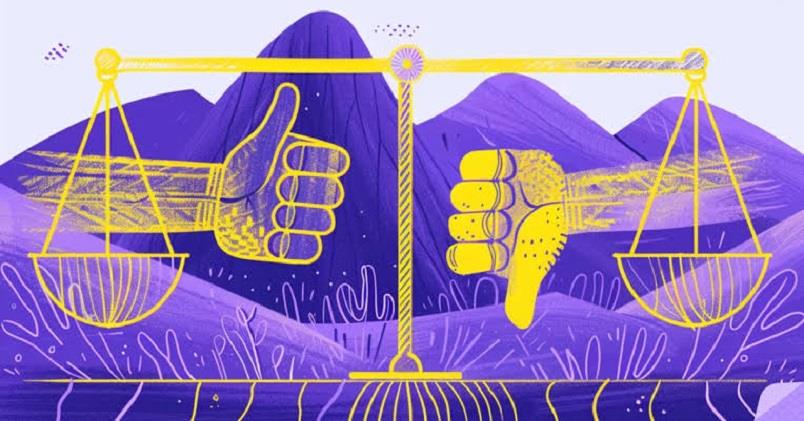
Breaking Free From Comparison
Read Also The Power Of Storytelling Things Fall Apart! Let Us Be The Change We Want To See
Comparison is an innate, unconscious mental habit. Have you ever caught yourself scrolling through social media, only to feel a sudden pang of inadequacy? This phenomenon, aptly named“comparisonitis,” is a sneaky intruder. It strikes when you encounter someone who seems“better” in some way-more successful, attractive, or accomplished.
Social media amplifies this tendency, with its endless stream of filtered images and staged moments. Arvind, for example, agonised over his relatively small follower count, oblivious to the fact that behind those polished posts lay untold struggles and imperfections. This relentless comparison erodes mental well-being, triggering anxiety, overthinking, and even depression.
Comparisonitis creeps in uninvited, whether during a casual chat or a random walk down the street. Spotting someone you view as more capable sets off a torrent of unhealthy apprehension. You're left feeling inadequate, even worthless. But you're not alone-many, like Arvind, face this silent struggle.
In essence, comparisonitis is the compulsion to measure your achievements against others, ignoring their unseen battles. Let's pause and remind ourselves: behind every triumph lies a story of effort and resilience.
Today, comparison ensnares even children. Growing up digitally, kids are exposed to unrealistic standards early, fuelling pressures that perpetuate dissatisfaction. Comparison begins through milestones, grades, and career achievements. While benchmarks offer context, they usually spark unhealthy competition.
The“perfect” lives online are often illusions, yet they tempt us to emulate others, furthering inferiority. Conversely, feeling superior by possessing what others lack stems from the same fragile ego seeking validation. Both extremes are bad. Historically, status, appearance, possessions, and talents have prompted comparisons, perpetuating emotional distress. Recognising the futility of this cycle is essential for cultivating inner peace.
The paradox of plenty
Imagine a person who has an overflowing wardrobe but feels compelled to shop for more every weekend. This abundance dilemma exemplifies how constant comparison creates discontent. No matter how much we have, the desire for more-sparked by seeing others who seem to“have it all”-leaves us feel wanting. This cycle traps us in a never-ending chase for 'self-importance'. Remember, this insatiable desire can rob us of contentment.
You've probably heard the age-old advice that it's not healthy to compare yourself to your neighbours or others, because you'll wind up bitter; since you'll always come up short of one person but ahead of another.
Also, comparisons invariably distort our perceptions. We might admire someone's professional success without seeing the sacrifices they've made. We're quick to notice the surface without understanding the depth of another's journey. This illusion only deepens our discontent. Don't forget, everyone has their own set of challenges, setbacks, and moments of doubt that they chose not to share.
Embrace your uniqueness
Overcoming the comparison trap calls for a mindset shift:
- Firstly, admire your individuality. Your journey, experiences, and aspirations are yours alone. Success isn't a universal formula; it's deeply personal. Instead of measuring yourself against others, focus on your progress. Reflect on how far you've come, celebrate small victories, and set goals that align with your values. Be your cheerleader.
- A practical approach is to shift your comparisons inward. Compete with yourself. For instance, Arvind could focus on improving his skills instead of obsessing over the number of“likes” his posts received. By striving to outdo your past self, you nurture growth without the emotional toll of external comparisons. See comparison as a way to grow.
- Gratitude is another powerful tool. Taking time to appreciate life's blessings-a loving family, supportive friends, or even the simple pleasures of a morning coffee-helps shift the focus from what you lack to what you have. Gratitude not only boosts happiness but also reduces the urge to compare.
- Taming“Comparisonitis” begins with mindfulness, grounding you in the present through meditation, hobbies, or nature. These activities help you savour the moment.
- “Unfollow” accounts that spark envy, and follow those promoting positivity and growth. Simplify your life and focus on what truly matters to find peace amidst societal noise.
So, are you ready to stop measuring your life against others and start living it on your terms?
- The author is a retired banker and a freelance writer
Follow this link to join our WhatsApp group : Join Now
| Be Part of Quality Journalism |
| Quality journalism takes a lot of time, money and hard work to produce and despite all the hardships we still do it. Our reporters and editors are working overtime in Kashmir and beyond to cover what you care about, break big stories, and expose injustices that can change lives. Today more people are reading Kashmir Observer than ever, but only a handful are paying while advertising revenues are falling fast. |
| ACT NOW |
| MONTHLY | Rs 100 | |
| YEARLY | Rs 1000 | |
| LIFETIME | Rs 10000 | |
CLICK FOR DETAILS

Legal Disclaimer:
MENAFN provides the information “as is” without warranty of any kind. We do not accept any responsibility or liability for the accuracy, content, images, videos, licenses, completeness, legality, or reliability of the information contained in this article. If you have any complaints or copyright issues related to this article, kindly contact the provider above.






















Comments
No comment